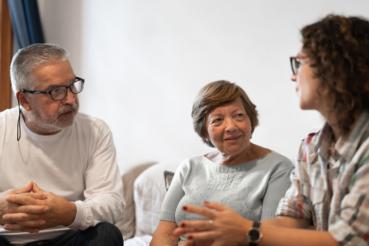Losing a dear friend or a loved one can often be overwhelming, especially immediately after the loss.
Many older adults have experienced this type of loss. In fact, later life can be marked by many different types of loss. An older adult may not only be mourning the loss of friends and family through death, they may also be mourning the loss of certain aspects of their health, independence and mental acuity.
"Most of these losses are met with amazing resilience," says Erin Emery-Tiburcio, PhD, a psychologist at Rush. "Yet, there are those who have trouble adjusting to life after a loss or become overpowered by feelings of grief that they find hard to shake."
When to get help
It's when symptoms of grief get in the way of your everyday life that you should consider getting help. "If you've gone six months or more and you're still not functioning well, you owe it to yourself to get some help," says Emery-Tiburcio.
Some things that might be of concern six months or longer after a loss include the following:
- Overwhelmed by constantly thinking of your loss
- Feeling that life is meaningless
- Difficulty trusting others since the loss
- Loss of interest in daily activities or things that used to bring you pleasure
"Some say 'time heals all wounds.' This is true in grief for about 65 percent of the population, but there are many who have a more complicated grief that may require treatment to overcome," Emery-Tiburcio says.
Take it one day at a time
A very helpful way to cope with loss is to live in the present. "Living in the past and wishing that life would be as it used to be is painful," says Emery-Tiburcio. "Attempting to maintain the same relationship with your lost loved one will only be met with failure. Recognizing that you can maintain a relationship with the deceased in a different form in the present can be much more helpful."
You can approach other losses this way as well, including the loss of independence, losing your role as a caregiver or your ability to drive. "These are elements of our identity, and when we lose them, we feel like we're losing a piece of ourselves," Emery-Tiburcio says. "Living in the present challenges us to find creative ways to define ourselves and how we fulfill our roles in life."
A very helpful way to cope with loss is to live in the present. Living in the past and wishing that life would be as it used to be is painful.
What you can do to cope
Some other coping mechanisms include the following:
- Engage in activities you used to enjoy (a hobby, sport, social activity, etc.)
- Reach out and become involved with other people (i.e. friends, family, neighbors, etc.)
- Start volunteering; helping others can also help you feel better
- Find new hobbies and interests that enable you to make new friends and get out of the house
- Talk with a psychologist or social worker
"The Waud Center at Rush is a great resource for local activities and services for older adults," notes Emery-Tiburcio. The Anne Byron Waud Patient and Family Resource Center for Healthy Aging can be reached at (800) 755-4411.
Changing your thinking in order to live more fully in the present moment is great advice for anyone, and it can help you recover from feelings of loss and grief.




